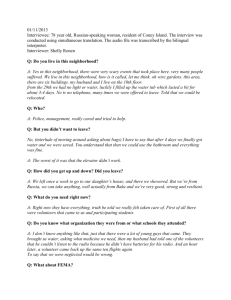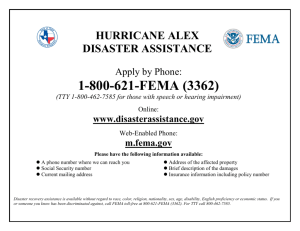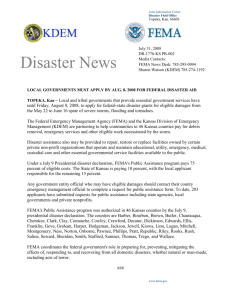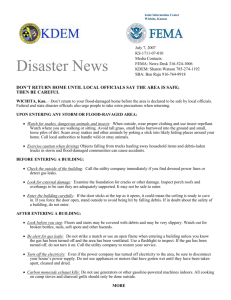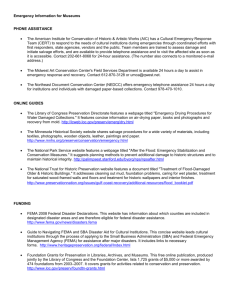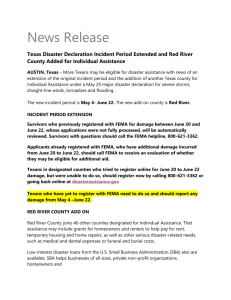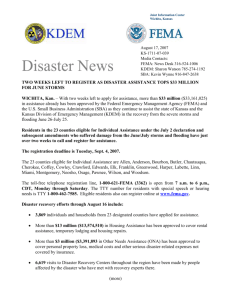NGO Roles in Disaster - ACP – Greater Tampa Bay
advertisement
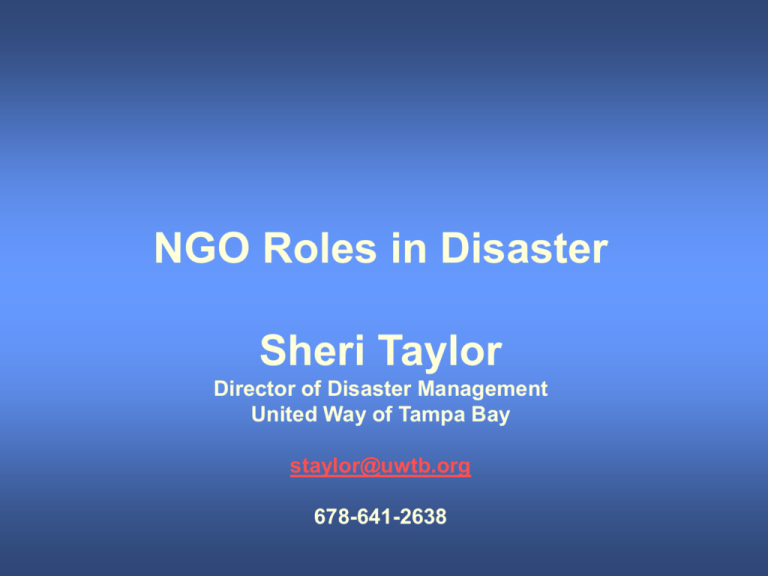
NGO Roles in Disaster Sheri Taylor Director of Disaster Management United Way of Tampa Bay staylor@uwtb.org 678-641-2638 Response (days to weeks) Assessments are being made to determine whether a declaration is needed to support recovery If there is no declaration approved, federal resources will not be available If a declaration is approved, federal teams will arrive and so will the dollars to support recovery President FEMA Headquarters FEMA Regional Office Governor American Red Cross is serving as the support organization for ESF 6 - Mass Care - Sheltering and Feeding Red Cross is managing shelters Red Cross is operating mobile feeding units Red Cross is conducting disaster assessments United Way of Tampa Bay is serving as the lead for Emergency Support Function 15 Volunteers and Donations Managing Volunteer Reception Centers for the coordination of unaffiliated volunteers Communicating with COAD team located at a Recovery Management Center for the coordination of affiliated volunteers Tracking and reporting local volunteer hours contributed to the state for required match Managing the receipt and distribution of financial donations Coordinating the requests and receipt of physical donations (no clothing) COAD is working with members to identify resource needs and resource availability Southern Baptist chain saw crews Seventh Day Adventist and Latter Day Saints donations warehouse Church of the Brethren and Lutheran Disaster Services child care providers American Baptist, United Methodist, Church of Christ, Catholic Charities, Nechama, Church World Service, etc. that support response and recovery efforts Untapped resources such as Rotary International, Jaycees, Kiwanis, and the Chambers of Commerce TECO is working to restore power DOT is working to clear roads DEM is working to get food and water to PODS for distribution Salvation Army and the Southern Baptist are serving meals Shelters are taking in new residents The DRLN and HELP, Inc. are assisting NGO’s through their Communications Plan to restore optimal service capacity as quickly as possible Recovery Recovery is short-term and long-term. Short-term recovery lasts for weeks to months. Long-term recovery lasts for months to years. Stafford Act Support state and local governments and citizens when disasters overwhelm them Establish process to request and obtain federal disaster declaration Define type and scope of assistance Set conditions to obtain assistance Individual assistance Grants Loans Technical assistance for human services Infrastructure support (public assistance) Hazard mitigation assistance Recovery Short Term (weeks to months) AGING VETERANS SSA CONSUMER LEGAL INSURANCE Exit DUA STATE/FEMA MANAGERS AGRI Enter Here WAITING AREA HAZ MIT SBA ARC TAX IHP Federally-Declared Sequence of Delivery Undeclared Disaster Sequence of Delivery FEMA Sequence of Assistance FEMA Housing Assistance SBA Loan for Real Property (More than One Category) 1. Temporary Housing 2. Home Repairs $29,900.00 3. Permanent Housing Construction Personal Property Local Gov’t, Voluntary Agencies Emergency Food, Shelter, Clothing, Medical Needs Homeowner loans up to $200,000 Refer for SBA Loan Unmet Needs Long Term Recovery Insurance (Homeowner, Renter, NFIP) Refer for SBA Loan SBA Loan for Personal Property Low interest loans up to $40,000 FEMA/State Other Needs Assistance (ONA) -Medical Expenses -Dental Expenses -Funeral Expenses -Other Disaster Needs Unmet Needs Long Term Recovery Unmet Needs Long Term Recovery THE LADDER OF ASSISTANCE Long-Term Recovery Committee Assistance from Voluntary Agencies for disasterrelated needs not covered by other programs. Other Needs Assistance Financial assistance to Individuals & Households who have disaster-related necessary expenses and serious needs not covered by insurance or addressed by SBA Loans. U.S. Small Business Administration (SBA) This is your first step for long-term recovery. You must apply for SBA before you can move forward. FEMA Disaster Housing Assistance Call FEMA at 1-800-621-3362 (FEMA) to register for assistance. Insurance You must apply with your insurance company. Voluntary Agencies For immediate needs like food and shelter. Long Term (months to years) The DRC’s have closed FEMA or others have found housing for impacted survivors Tarps or temporary repairs have been made Muck-out’s have been completed Applications have been completed and filed Insurance companies are paying claims Unmet needs are now in the hands of the community Long-term Recovery Organizations Bring Together… Organizations with case managers to address survivors’ unmet and long-term recovery needs – long-term recovery is case management driven Organizations and individuals with resources to meet needs Donations and volunteers Emotional and spiritual care providers Nonprofit organization with its own 501(c)(3) Helps a client base, with each member providing resources Composed of representatives of disaster response and/or recovery organizations and community stakeholders Directs its work toward assisting those impacted by the disaster with long-term needs PROUD and HELP Stakeholders have been working to create a long-term recovery organization in Pinellas and Hillsborough PROUD is completing a 501 c 3, HELP has it’s 501 c 3 Will be run by a Board of representatives from the community who will activate and hire staff after a disaster to serve as: Executive Director Construction Supervisor Case Coordinator Volunteer Coordinator Financial Manager PROUD and HELP Will serve as a benefits navigators and leverage all available resources to meet unmet needs to include home repair or rebuild How can we help you We are your resource for long-term recovery needs for your employees Most organizations do not educate employees on the sequence of resource assistance and how the process works Most organizations do not have access to response teams that can provide short-term repairs that can save a home Most organizations do not have trained staff to provide emotional, spiritual, or mental health care to an impacted employee How can you help us Join us as a potential resource for community recovery – join ESF 18 Tell us who you are, how to contact you and what resources you bring to the table Advocate with your employees for disaster volunteer training opportunities Let us provide training to your employees on what to expect for resource help and how to access funds to mitigate a home You are the business continuity planning experts – how do we prepare our businesses for the inevitable We are the hands-on experts for full recovery for your employees – how do we prepare your employees and our communities to be a part of their own recovery GIVE. | ADVOCATE. | VOLUNTEER.
